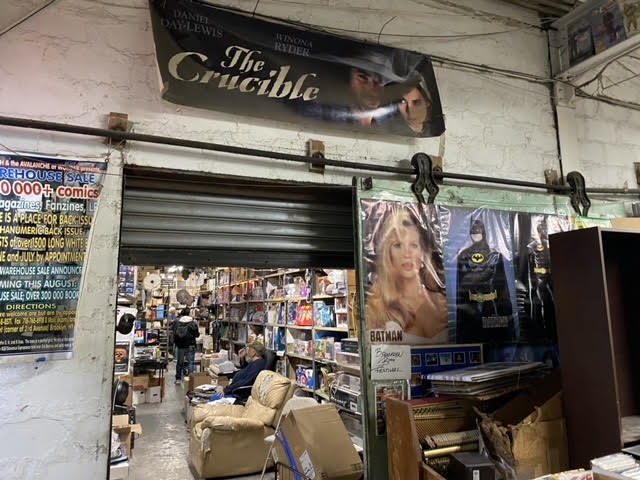It takes standing in a warehouse full of comics to gain somewhat of an understanding of how vast the entire history of the medium truly is. There’s just not that many chances to do this, to take in the enormity of it all in a place filled to the brim with boxes upon boxes of single issues and adjacent merch. Joseph Koch’s Comic Book Warehouse is one such place, and the cruel march of rising rent costs, inflation, and outright greed has forced the location to announce it is closing its doors.
Located in the Sunset Park area of Brooklyn, the warehouse is the stuff of legend. Mention of its name in conventions and other comic book shops built up a location that was, in essence, a memory palace.
It carried an irregular operation schedule, opening either on weekends or by appointment. Given its elusive state of being, it took me a while to finally make the trip over. In fact, it was news of its closing that finally got me to right that wrong. Turns out the threat of losing something important to history is a strong motivator, but one that has the potential to kick in too late.
Upon first entering the warehouse, you’re met with a sense of potential discovery. No specific issue or book or action figure will be readily available upon request. You have to work for your find. The reward, on the other hand, can come in multiple unexpected forms. Dedicated single issue hunters have a great chance at landing that hard-to-find item, but what they’d discover in the process would probably eclipse the actual reason they went to Koch’s in the first place.
I didn’t go with a specific comic in mind to find. No mission other than the experience. Not five minutes in, though, I stumbled upon stacks of Humanoid/DC books that only ever tend to crop up either in smaller conventions or older comic book stores that overstocked in them thinking they’d yield a small fortune. Jordorowsky and Bess’s Son of the Gun, Baranko’s The Horde, Carlos Portela and Das Pastoras’s Deicide, and Mark Malés’s Different Ugliness, Different Madness were all there and in plentiful amounts. It felt like getting a look into the comics market of the past to appreciate what was trying to hit it off with readers (and maybe didn’t, to the extent that was expected at least).
One find in particular was a stark reminder of how comics are always trying to make what’s old new again. In one of the shelves furthest from the entrance was a section that had more adult comics mixed in with oversized editions of masterworks and classics. Among them were the first ten to twelve issues of the 1994 Penthouse Comix magazine, which ran up to 1998. Of special note was issue #7, which featured an erotic take on (not) Batman by comics legend Moebius. In it, Batman goes to the shrink and is confronted by his dress-up fetishes.
It was hard not to think of the current Penthouse Comix reboot and reflect on whether it’ll meet the same fate as it did in the Nineties. Seeing a past attempt at something preserved in a warehouse would bring up questions on whether it would find a more willing audience today to become a more constant presence in the comics landscape. Hell, if it will even become a part of the conversation.
A few shelves over led to old Vertigo books that I had never even heard of before, found next to a box filled with House of Hammer horror magazines that featured comics adaptations of some of the studio’s most popular movies. In a sense, the warehouse also speaks to the cruelty of time and how it elevates as much stuff as it forgets.
These are the types of things that a single visit can bring to the fore. You can’t help but think how much or how little comics have changed throughout the years. By merely existing, Koch’s Comic Book Warehouse became a statement on the nature of comics as an industry. It only has a bit more time left in that role.
Comics history isn’t the only thing getting lost when it closes its doors for the last time. Koch’s also housed old newspapers, a hefty collection of Playboys and other adult periodicals, comics-adjacent toys and merch, sci-fi books, VHS cassettes, posters, trading cards, and random objects that look like they were acquired in a yard sale or from the Warrens’ occult artefact room from The Conjuring films.
All of it would fit in well in a museum, and it would be quite sad if it ends up boxed and taken to the dump. Some local comic stores have been taking stock off them, but not all of it will make it to someone else’s hands. The volume of what can potentially be lost equates to losing the finer details of a complicated narrative that thrives in minutiae.
If you have the opportunity and haven’t done so yet, give Koch’s Comic Book Warehouse a visit. If you’ve been before, go again. Surround yourself in the history of a medium, of an industry, and acknowledge the expansiveness of human creativity that lives in the things that still inhabit that space for a little while longer. You won’t get many more opportunities to do so.
Source: Graphic Policy




